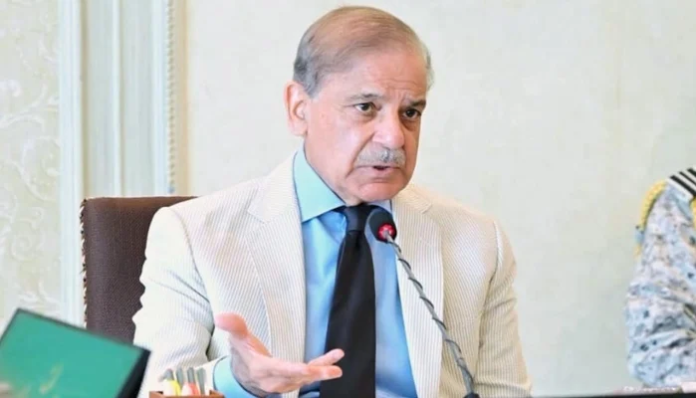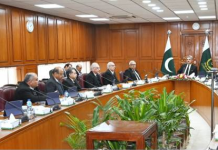ISLAMABAD, JUN 17 (DNA): Prime Minister Shehbaz Sharif on Monday ordered relaxation and the inclusion of six safeguards in the Finance Act to prevent misuse of arrest powers by Federal Board of Revenue (FBR) officers in tax fraud cases, following strong objections from parliamentarians and the business community.
Chairing a review meeting on FBR-related matters, the prime minister instructed the formation of a special committee and emphasised that taxpayers and businesspersons must not be subjected to harassment under any circumstances.
The meeting was attended by the ministers for defence, law, commerce, economic affairs, and information, the minister of state for railways, the FBR chairman, economic experts, and senior officials.
PM Shehbaz was briefed that the legal provisions for the arrest of sales tax defaulters had been part of the law since the 1990s; however, in light of decisions by the courts, amendments were being made to the clauses to make them more coherent.
After thoroughly reviewing the matter, the prime minister opined that harassing regular taxpayers was unacceptable.
“Respect and dignity of the business community and investors is of utmost importance to us and any unjustified harassment is intolerable,” he added. He further instructed that the mandate of arrest under relevant tax laws should be limited only to cases involving defaulters of an extraordinary scale.
The prime minister also directed that an effective system of external review and checks and balances be put in place regarding arrests.
Provisions related to protection against misuse of these laws should be included in the Finance Act, he observed.
He further directed that all allied parties in the parliament should be consulted on the issue.
The six pre-requisite conditions for incorporating arrests of CEOs, CFOs and board of directors include safeguards such as:
- If a person involved in tax fraud tries to escape;
- tries tampering of evidence;
- three notices were issued for summoning but not appearing;
- certain tax fraud limit;
- tax fraud of Rs50 million for arrest of executives;
- approved by special board of the FBR along with representative of private member probably from the chamber of commerce for arrests.
The IMF has agreed with the FBR on materialising Rs389 billion through effective enforcement of the laid-down Finance Bill 2025-26.
Although the ministers claimed before the Senate and National Assembly panels that the arrest powers had already been vested in the FBR under the existing laws, the FBR proposed abolition of Rs1 billion threshold and also jacked up imprisonment from 5 to 10 years.
The FBR faces a dilemma that if the parliament diluted its enforcement actions, the IMF will ask the government to take additional measures through a mini-budget during the Financial Year 2025-26.
However, the Senate Standing Committee on Finance and Revenues was Monday shocked when Senator Anusha Rahman raised the issue that the abandoned authority’s surplus money of Rs45 billion was available but not made part of the Consolidated Fund Account.
“There are 12 employees and a few other subordinate staff in the Authority. Why don’t they seek allocation from the Ministry of Finance?”
She further elaborated that the same was the case with the Nadra technology, whereby they were charged by the government on each verification.
They even charged the ECP Rs40 on verification of voters on the Election Day. The issue came to the surface when the Ministry of Finance tabled amendments to the Public Finance Management (PFM) Act through the Finance Bill 2025-26.
The senators sought the details of all such entities that possessed surplus money and were parked in banks for allegedly drawing personal benefits, and why they did not bother to deposit it into the consolidated fund account of the government.
The committee met under the chairmanship of Senator Salem Mandviwalla. The panel delved into the clauses on “Offences, Penalties, and Punishment on Tax Fraud.”
Senator Farooq H. Naek from the PPP proposed multiple legal recommendations, including reducing penalties for tax fraud from Rs10 million to Rs5 million and sentence from 10 years to 5 years, requiring the issuance of three separate notices before prosecution, mandating the High Court to decide tax appeals within 60 days and separating inquiry, investigation, and court trial phases.
Senator Naek emphasized that a two-year sentence was already harsh for a businessman. “Ten years is excessive. Penalties must be proportionate and not politicized,” he added.
Echoing this sentiment, Senator Shibli Faraz said, “Tax laws must not be used for political victimization.”
The committee approved a new clause for inspection of audit firms under the 2025 Bill. FBR officials explained that many audit firms were failing to meet international standards and merely “stamp papers.”
Senator Anusha Rehman raised critical points about the regulation of e-commerce platforms emphasizing not to burden individuals specifically (Youth and Women) using online platforms for generating income, and to set a threshold to register platforms doing business above a certain amount.
Market place online is no different from market place offline and the FBR should strive to register market places offline, she said.
On the proposed e-billing system, Senator Mohsin Aziz noted, “Malaysia began phased implementation three years ago. We must assess our readiness.”
Mandviwalla acknowledged the valuable suggestions of Senator Mohsin Aziz stating to bring written proposals for phased implementation of e-billing. Talking will not suffice.
The committee examined the tax exemption policy for FATA/PATA, which will begin phasing out with a 10% GST in the next fiscal year—gradually increasing to 18%.
The committee also discussed the “Islamabad Capital Territory (Tax on Service) 2001, Provisions of the Finance Bill, 2005. It was discussed that as per the IMF bench mark, “negative list of services” should also be developed.
The committee chairman warned that the Sindh government was raising its concerns that the FBR was interfering in their jurisdiction of services which was the domain of the provinces.
Discussing the Federal Excise Provisions of Finance Bill, 2025, the committee approved abolition of the Federal Excise Duty (FED) on immovable property.

















